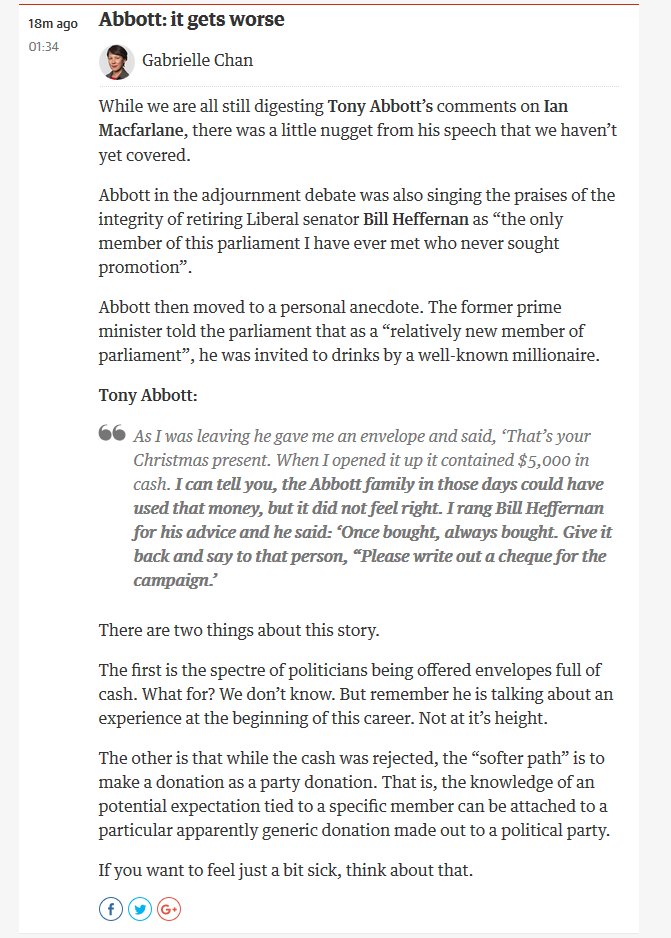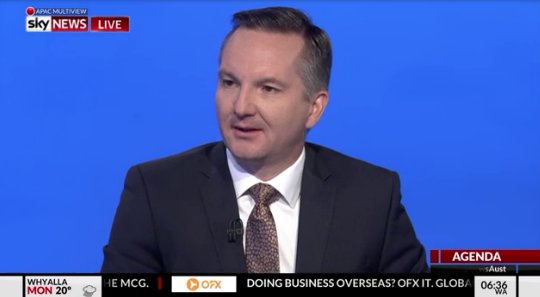The criticisms against super changes are against their retrospectivity rather the super changes themselves. I think this is fair criticism and not really populist.
They aren't retrospective. Any more than any other tax changes are.
When you have a Liberal party that has cut funding to health, education and other measures that have disproportionally affected lower income earners, how is pointing out that the Liberal party prioritising negative gearing, which benefits high income earners, and cutting the company tax rate, inciting class warfare?
They cut funding to measures that Labor didn't fund. If they want to fund Gonski and the education increases they're more than welcome to raise the taxes themselves.
And company taxes are paid by the working class. I don't agree with negative gearing but lets not pretend its possible for the LNP to make all the changes at once. They couldn't even fix bracket creep entirely this budget.
The Liberals like to pretend that they don't deal with class warfare but ideologically it's all over their priorities. I mean they've spent more than the last Labor government despite all the cuts to health, science, renewable energies, education etc. etc.
It's a fundamental difference in ideologies. I don't see 'class warfare' from the LNP's changes. The 2014 budget you might have a point, but there is little evidence to suggest Turnbull is as ideologically inclined as his idiot predecessor.
For me, Shorten's weakest asset was his PR game. The zingers he was using during the Abbot era were obviously shitty. However, I do think he is underrated in terms of managing his team and developing policy, which at the end of day is the most important part of being a politician.
I think Shorten is very good as a team manager and a policy developer. He's somewhat like Gillard in this regard. They both have that same lack of charisma.
And as much as I'd like Shorten to have more credit for these things, it's just very difficult to do so. Keating is more known for his acerbic caustic wit than his brilliance as a policy developer.
The Turnball budget wasn't a horror show like the infamous Abbot/Hockey budget, but it is obviously a desperate and defensive budget, which can be seen in appropriating Labor measures on superannuation, cigarette tax, multinational tax avoidance, despite them attacking Labor for these measures throughout the year.
So what? Seriously so what? It's a good budget that is a win for the vast majority of the population.
Also, I strongly disagree in describing Shorten as Abbot-lite. Abbot was a complete trainwreck who was constantly on attack mode, no matter the occasion. He is also defined by his arrogance and outright lies during the election season., and Shorten hasn't come close to those things. I mean his main weakness is that he appears a bit of a wet noodle and has a bad reputation from being involved in the coups of Rudd/Gillard, rather than being known as the aggressive Labor attack dog.
That was a bit hyperbolic, but yea, I'd prefer Shorten stuck to what he was good at. Going on rhetorical attacks isn't it. The man has the ability to make a very good PM. Like a Howard of the centre. Howard going populist was his undoing, I hope Shorten doesn't jump the shark here.
So... Cutting a tax rate that companies are already not paying and barely saving the top 25% an amount that they wouldn't even notice in terms of their incomes, while just the former will cost the government well over $50 over the next ten years? Yeah, real good fiscal policy, there.
Company taxes are paid by the working class.
http://www.treasury.gov.au/~/media/...g Paper 2015 01/Documents/PDF/TWP2015-01.ashx
http://www.treasury.gov.au/Publicat...e-1/The-incidence-of-company-tax-in-Australia
Dropping the company tax rate is a direct reduction in taxation on the working class. It's good policy, especially as it increases long-run wage growth rather than merely increases after-tax disposable income. It's long-term planning.
Also that article is not good. The tax changes have nothing to do with the laffer curve. Company tax has a massive marginal excess burden. Otherwise known as the distortionary effect that the behavioural changes from the implementation of a tax cause. It's a massive drag on Australia's prosperity.
There is literally no evidence to support the notion that tax cuts on businesses and the rich do anything for growth, if anything they actually reduce growth.
Are you serious right now? Have you seen the Treasury modelling for the company tax cut? Extra 1% GDP growth over 10 years. That's massive. Tax cuts increase growth, there is literally nothing else that could happen as a result.
If what you're proposing was true we could hit taxes up to 100% and watch as the economy exploded with growth and we could afford any welfare proposal we ever wanted to implement.
Also, what happened to a more normal bird? It looks like his account got nuked. Did he do something awful?


